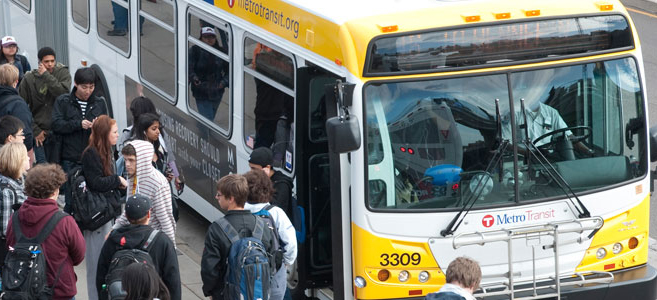You may have noticed fewer yellow school buses driving around St. Paul this fall.
Saint Paul Public Schools is trying something out: busing students via Metro Transit to four high schools instead of contracting with private school bus companies. Though they can get to school any way they want, all students are being provided with unlimited transit passes.
As a high school teacher who moonlights as a transportation advocate, I’m excited for this change. But it has the potential to either go very well—or to backfire terribly.
We aren’t the first to do this. High schoolers take public transit in far-off cities such as New York City and Minneapolis. And here in St. Paul, we’ve had a pilot program at several schools since 2015.
Metro Transit worked together with the district to analyze hypothetical transit trips for each school’s student population using Trip Planner, according to Kristin Thompson, assistant director of service development. Students at Johnson, Creative Arts, and Gordon Parks High Schools were selected, she says, because "most students [at those schools] had relatively short trips with no transfers needed"; there were no students whose Metro Transit route took longer than the longest yellow bus route. As part of the pilot program, Metro Transit added more frequency to the routes that pass near the schools during their rush hours.
Michael Thompson, who was the principal at Johnson when the pilot program started, says the details really matter. In order to cut down on students selling their passes, Johnson started charging $10 to replace lost cards. The school also taught students to be more familiar with the bus system, focusing particularly on how to use the ride planner app.
The passes also served as leverage to get the attention of students who weren’t coming to school; when their transit passes were deactivated, most of those students started and continued attending school again.
The response was overwhelmingly positive. Thompson says that student participation in after school activities jumped significantly. Students also often use the passes to get to and from jobs and activities outside of school.
Thompson is particularly enthusiastic about the reduction in disciplinary reports.
"In the first five years of having our students on Metro Transit, we had a grand total of three,” he says. “In comparison, in a regular year when we were running our yellow school bus routes, we had an average of 32 bus discipline reports each year."
Thompson says he thinks students didn’t want to risk having their passes revoked. And over those five years, there was not a single report of Johnson students being harassed by other riders.
This year’s transition took place under inopportune circumstances: Because of a nationwide bus driver shortage, the district was short about 100 buses and had to scramble for a solution. Schools found out the Friday before opening week that they were switching to Metro Transit, which gave staff two days to work up a messaging plan and prepare families.
Jackie Turner, chief operating officer at SPPS, says that in an ideal scenario the district would spend at least a year working with Metro Transit and communicating with families about the upcoming change.
So, how has it been going? I have ridden to school with my students, and the large articulated bus was very close to being full by the time we got to school.
However, a separate issue has popped up at Harding, where I teach: Part of our service area is the Battle Creek neighborhood, which has no transit service south of Lower Afton Road. Some students live two miles from the nearest bus stop. The school is well-served by transit, but not all of its students are.
Many Harding families have opted to drive their kids to school, whether due to poor bus coverage, safety fears, or other concerns about adjusting to the new system. There’s been a long line of cars waiting to get into the Harding campus to drop kids off each day, and many students are late to class.
"Without this decision [to move Metro Transit busing], it would have left about 5,600 students without a bus driver this year," Turner says. As for students who have fallen into the gaps of the transit system; the only real solution for that is for us to build higher density housing throughout the city so transit lines to those areas are feasible—which is not, of course, a short-term solution.
In the meantime, schools need to support students in biking to school in addition to busing; providing safety equipment, ample bike racks, and information about safe routes to school would go a long way. The schools also need to improve their messaging about how safe, easy, and convenient it is to ride the bus to convince more families to send their students on Metro Transit. Breaking through our car mentality takes a lot of work.






